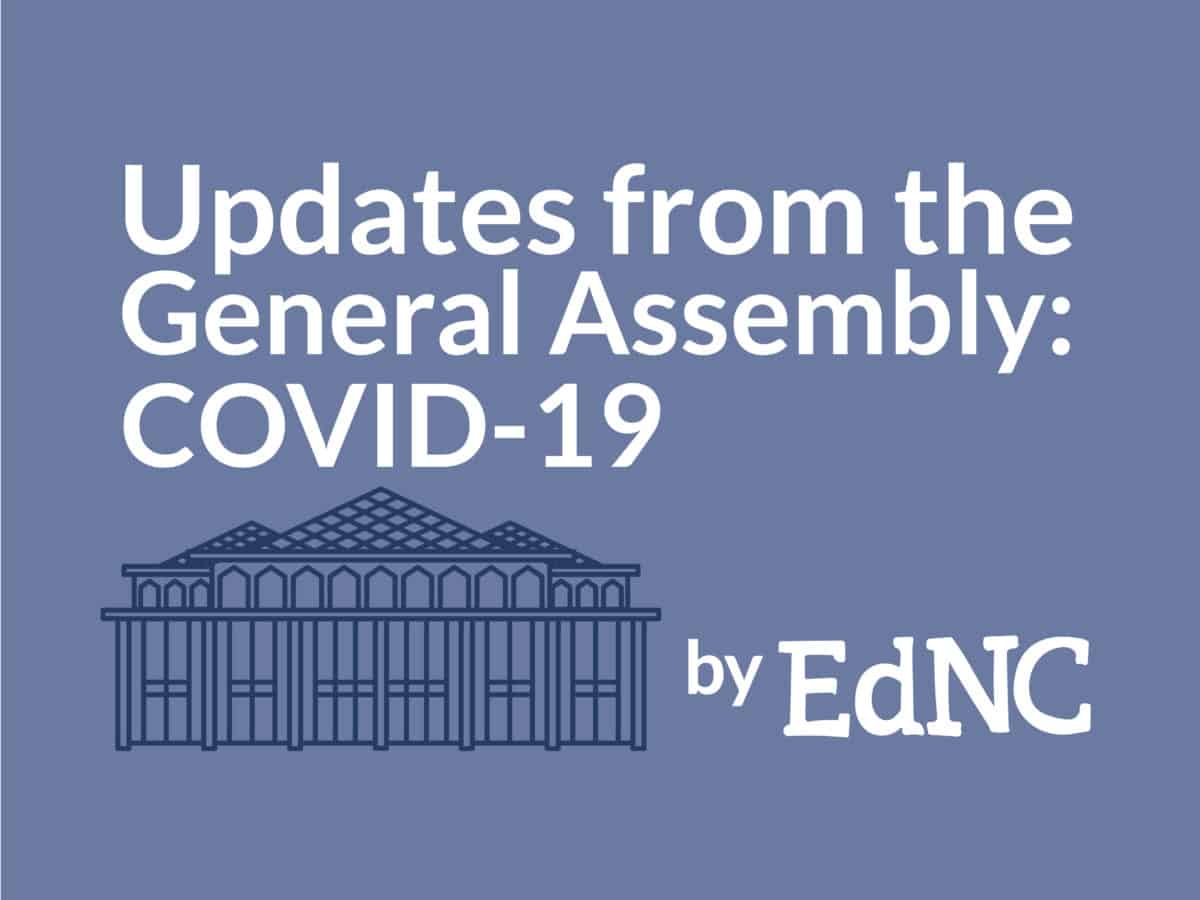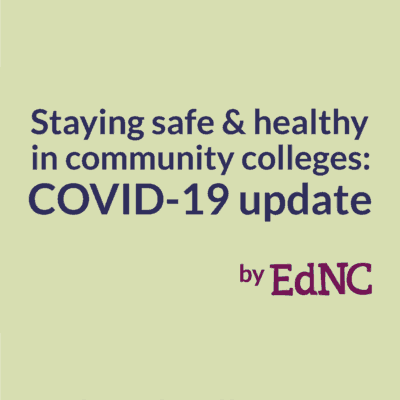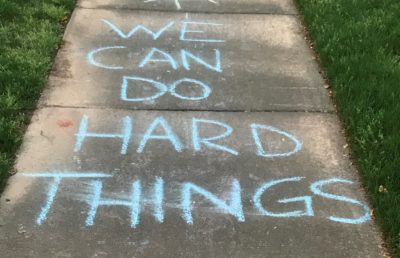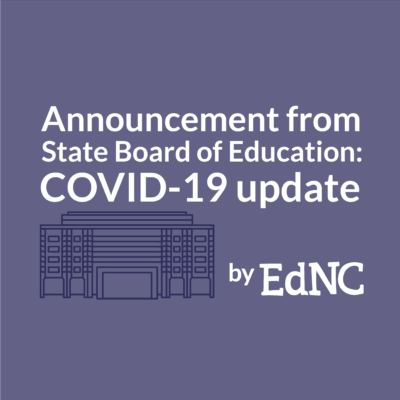

State lawmakers continued to tackle the educational implications of COVID-19 today, with both the State Board of Education and a General Assembly working group meeting to consider what policies and legislation need to change to address the crisis.
The education working group of the House Select Committee on COVID-19 heard recommendations on statutes related to K-12 funding flexibility, principal pay, K-3 class-size rules, and the state’s non-public schools.
Among the recommendations from the chairs of the working group were increased funding flexibility for districts, flexibility to use textbook allotments to purchase digital devices, and a one-year delay in the implementation of K-3 class size restrictions.
This is how the class size restrictions were supposed to be phased in, according to General Assembly documents:
“For 2020-21, the average class size for K-3 must be 18, and the individual class size can be no more than 21.


“For 2021-22, LEAs must meet the requirements of GS 115C-301, which require average class sizes ranging from 16 for 1st grade, 17 for 2nd and 3rd grade, and 18 for kindergarten, and individual class sizes of no more than 3 higher than the required average for that grade level.”
These restrictions would all be pushed back by a year if the General Assembly approves legislation that includes recommendations from the chairs of the education working group. The chairs are Rep. Craig Horn, R-Union, Rep. John Fraley, R-Iredell, and Rep. Ashton Wheeler Clemmons, D-Guilford.
The recommendations would also delay by a year enhancement teacher funding, which was set to increase annually through 2021-22.
For non-public schools, the chairs are recommending testing requirements be waived for this school year for private and home school students.
The working group also looked at recommendations related to the transforming principal preparation program, the community college youth apprenticeship program, and the state’s opportunity scholarship program. The opportunity scholarship program gives public funds to families to spend on private school tuition.
The working group also looked at a draft bill that could be considered this upcoming General Assembly short session that provides the statutory relief that has been discussed by the group. It would take care of the requirements related to testing, school performance grades, the Innovative School District, summer reading camps, third-grade retention, educator preparation program requirements, teacher licensure, and more. Read our previous coverage of some of these recommendations here.
Here is a high-level description of what the draft bill includes.
Here is the actual bill draft.
Rep. Cecil Brockman, D-Guilford, asked if the working group was going to take up teacher pay raises. Because the legislature was unable to work out a final budget or a teacher pay deal with Democratic Gov. Roy Cooper, teachers did not receive a pay increase during the long session cycle. Horn said that the charge of the working group is to deal only with COVID-19 related topics. Teachers have continued to get paid during the COVID-19 crisis.
Horn said the working group vote on the proposed legislation will come during next week’s meeting.
The short session of the General Assembly starts April 28.
State Board continues work on COVID-19
The State Board took up a number of matters, including driver’s education, distribution of federal funds, and matters related to a digital teaching grant.
The State Board voted to ask for an extension of the expenditure date for the Digital Teaching and Learning Initiative Grant. According to the presentation, 22 districts are in the process of implementing grant funds. Almost $750,000 remains to be spent, and according to current rules, must be spent by June 30. The State Board wants to extend the date to December 31. In order for this to happen, the legislature would have to act.
The State Board also voted to ask the General Assembly for a carryover allowance for driver’s education funds. Driver’s education is funded every year, but any unspent funds go back to the state. Typically, the summer is a key time for driver’s education, but given the COVID-19 crisis, it’s likely the program will have a lot of unspent funds that are lost by districts. The request would allow the program to carry over funds to next year to meet any shortfalls that might happen in next year’s budget. A shortfall next year could cause the driver’s education program to shut down.
“As you can imagine, we have a justifiable reason [to ask for legislative action] this particular year,” said State Board Vice Chair Alan Duncan.
The Board also had a number of items for discussion only, including what to do with the Governor’s School of North Carolina, which meets over the summer. Duncan said no decision has been made yet on whether to cancel.
The Board also heard about the Coronavirus Aid, Relief, and Economic Security (CARES) Act, which will distribute $30,750,000,000 to the nation’s K-12 and higher education systems in response to COVID-19. North Carolina would get an estimated almost $390 million under the act. DPI would award at least 90% of the money to districts, the ISD, regional schools, charters schools, and lab schools. Each would get the same proportion that they get for Title I, Part A.
The following document gives a rough estimate of how funds would be distributed.
As part of the CARES act, money is also being given to North Carolina in something called the Governor’s Emergency Education Relief Fund. North Carolina is getting almost $96 million in this fund.
Those funds can be used in the following manner and will be distributed by Cooper, according to State Board meeting documents.
- “(1) provide emergency support through grants to local educational agencies that the State educational agency deems have been most significantly impacted by coronavirus to support the ability of such local educational agencies to continue to provide educational services to their students and to support the on-going functionality of the local educational agency;
- “(2) provide emergency support through grants to institutions of higher education serving students within the State that the Governor determines have been most significantly impacted by coronavirus to support the ability of such institutions to continue to provide educational services and support the on-going functionality of the institution; and
- “(3) provide support to any other institution of higher education, local educational agency, or education related entity within the State that the Governor deems essential for carrying out emergency educational services to students for authorized activities described in section 18003(d)(1) of this title or the Higher Education Act, the provision of child care and early childhood education, social and emotional support, and the protection of education-related jobs.”
State Superintendent Mark Johnson brought up a request from the State Board that was emailed to the State Budget Office for $250 million related to COVID-19 relief, asking when the request would be brought before the public. State Board Chair Eric Davis said it would be put on a future meeting agenda. Johnson criticized what he called the State Board’s lack of transparency in making the request before bringing it up in a public meeting. Johnson also criticized what he said was the lack of exceptional children funding in the request.
The email included requests for $80 million for child nutrition services, $50 million for increased social/emotional support staff, $75 million for the Summer Bridge-Jump Start Program, $1.5 million for “K-3 Literacy and Core Instructional support for COVID-19 Response,” and $50 million for things like internet connectivity, digital devices, and curricula.
Graham Wilson, director of communication and information services at the State Department of Public Instruction, said that DPI’s CFO and the agency budget office were not made aware of the request. Some Board members also said during the meeting that they weren’t familiar with the emailed request.
In criticizing the Board during the virtual meeting, Johnson also brought up a contract with SREB, which he said Davis approved illegally, as well as the recent formula for distributing $50 million in supplemental funds related to COVID-19. The Board had decided to use a distribution formula that would be split evenly based on poverty levels in the district and allotted average daily membership — essentially student enrollment of a school.
Under the formula, Charlotte-Mecklenburg Schools was cut out of any funds related to poverty levels. It was the only district in the state that didn’t get any funds based on that criteria.




